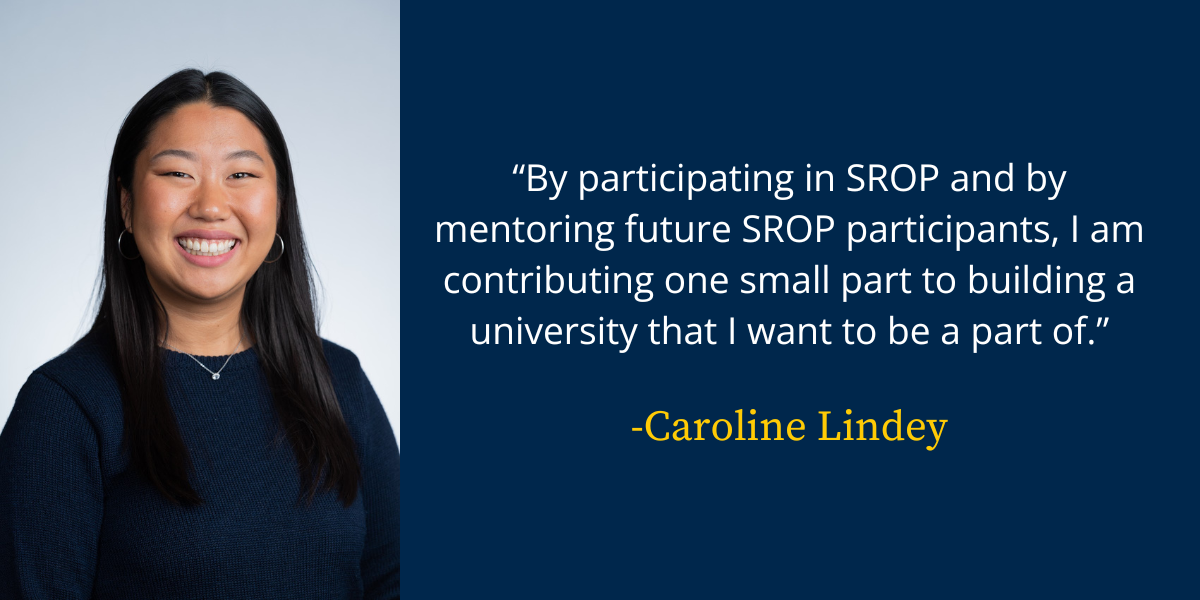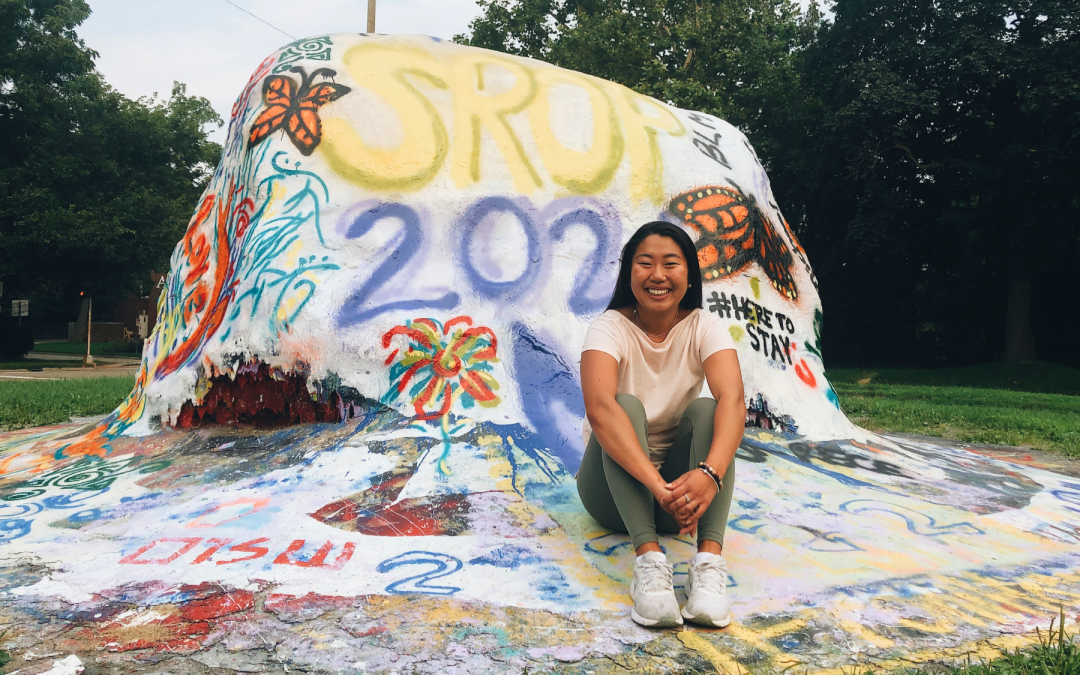Each summer, the University of Michigan Summer Research Opportunity Program (SROP) hosts undergraduate students who are underrepresented in their fields of study on the U-M campus for 10 weeks. In addition to working on a research project with U-M faculty and graduate students, SROP participants enjoy professional development workshops and opportunities to build their scholarly networks with peers and with current graduate students. Learn more about SROP.
Rackham student Caroline Lindey knew that she wanted to be a political science professor ever since her first undergraduate international relations seminar at Boston University.
“I wanted to be the person up front teaching. I just knew I wanted to be a scholar and a professor one day,” Lindey says.
When looking for ways to prepare for her dream job, Lindey knew that she’d need to go to graduate school and that the University of Michigan’s Summer Research Opportunity Program (SROP) would set her on the right path.
What she didn’t know was just how much SROP would come to define her graduate school experience—especially the strong and ongoing community connection that the program fosters. Lindey describes the camaraderie formed during lunchtime conversations in the dining hall, where her SROP cohort was just as likely to debate about “the best movies ever made” as they were to open up about their deeply personal experiences of being first generation college students, undocumented or DACA students, and/or students who work full time to support their family while attending college.
“Those conversations were really where I started to develop my voice and my story and how I wanted to craft my narrative,” Lindey says. “It’s a story of decisions that I made and the agency I had over them to lead me to this point.”
A Lasting Impact

Caroline Lindey champions the relationships and friendships built within the Summer Research Opportunity Program.
SROP participants are also paired with faculty mentors who provide guidance over the course of the summer. Lindey’s mentor, Chris Fariss, has continued to play an active role in Lindey’s journey, serving as her faculty mentor in U-M’s political science department.
“During grad school application time, Chris was so great about deconstructing barriers to entry. Academia can be a black box, and he was really transparent about pulling down the veil and answering all my questions,” Lindey says. “Now as my mentor in grad school, he continues to encourage me to prioritize my research first and foremost.”
After the summer ends, SROP participants are invited to get matched with a graduate student coach who meets with them weekly for one-on-one graduate school application prep sessions, where students learn how to find the programs that best fit their goals, how to write their personal statement, and more. Mentorship continues into the winter semester to provide guidance on graduate school interviews, with SROP group sessions happening every few weeks.
“Don’t worry about crafting a picture-perfect, polished essay. Be authentic, tell your story, and just click ‘submit.’”
Now in her second year of Ph.D. studies, Lindey assists in evaluating SROP applications and providing guidance to program participants.
“When alums of SROP help to guide the new classes of students, all of the energy and investment that we received through the program gets reinvested into another group,” Lindey says.
Her advice to undergraduate students looking to apply to SROP is simple: Don’t worry about crafting a picture-perfect, polished essay. Be authentic, tell your story, and just click “submit.”
“The best way I know how to advocate for you is if you are honest and truthful with me about your experiences, how you picture yourself, and how you got to where you are today,” Lindey says.
When reflecting on where she is today, Lindey lights up when she speaks of her SROP alumni community and encourages SROP participants to get to know as many people as possible during the course of the program.
“About 15 people from my SROP cohort are here at Michigan with me, including my roommate,” Lindey says.
“We celebrate holidays, birthdays, and engagements together. And to think it all started with dining hall conversations during our SROP summer.”
Inspiring Change

Lindey’s current graduate-level research focuses on global politics and trends in human rights practices. She is also busy building skills for her future work with undergraduates, intentionally crafting her approach to teaching and to mentorship.
“My hope is that when I enter the classroom, I’m able to bring energy and enthusiasm, inspiring students to ask deeper questions,” Lindey says.
In addition, Lindey wants to empower and encourage students to be active creators in our democracy and in global politics more broadly.
“I’m here because of SROP, and my hope is that, over time, it’s going to change the look and makeup of academia,” she says.
“It’s going to change what we research, it’s going to change who researches what. And most importantly, it’s going to change our perception of what good research looks like. By participating in SROP and by mentoring future SROP participants, I am contributing one small part to building a university that I want to be a part of.”
Support SROP students like Caroline Lindey this Giving Tuesday.
How Rackham Helps
In addition to her experiences with SROP, Caroline Lindey is also a Rackham Merit Fellow, which provides funding with no work requirements for years one, four, and five of her Ph.D. studies.
“When I finish up my third year of classes, teaching, and my preliminary exams, I will be completing my dissertation fully remotely from Washington, D.C. with my lovely fiance. I’m so fortunate that I get to work on my research as I get into the thick of my young adult life.”
The Rackham Merit Fellowship Program helps sustain the academic excellence and inclusiveness of the Michigan graduate community, one that embraces students with diverse experiences and goals, and who come from many educational, cultural, geographic, and familial backgrounds. By offering financial assistance to those students who might not otherwise have access, the program aims to reduce disparities in graduate education.

